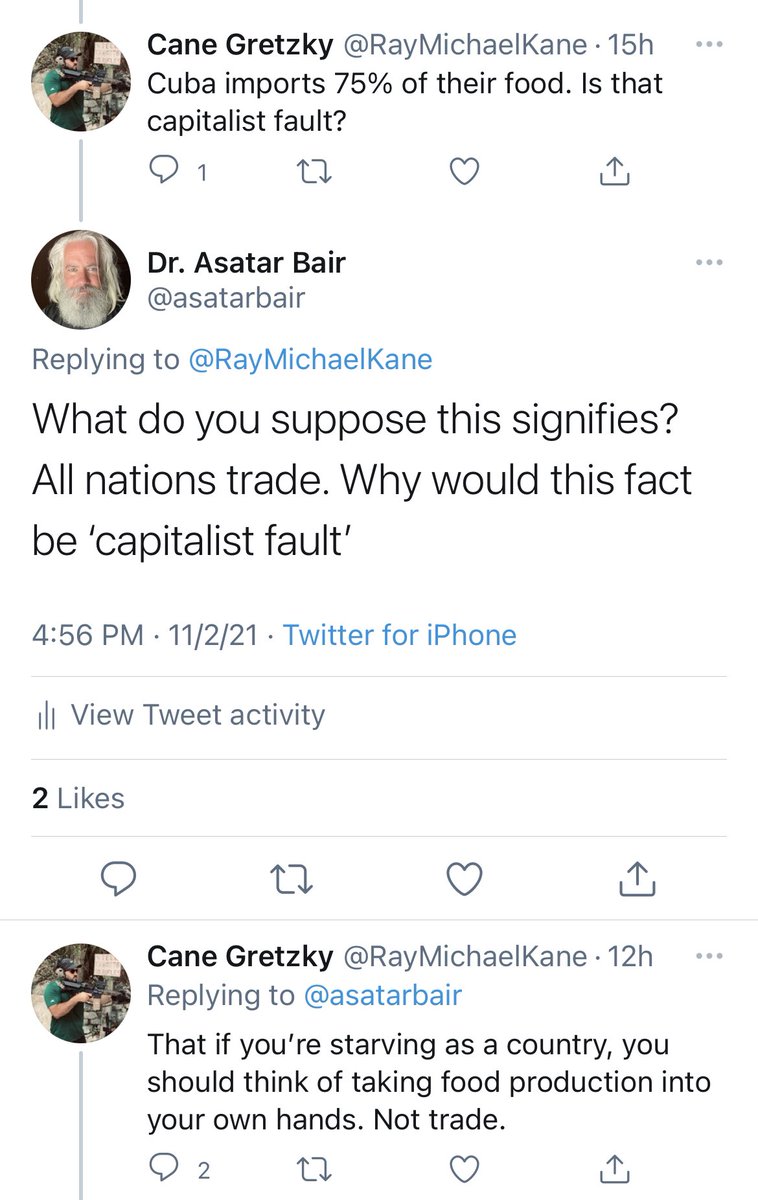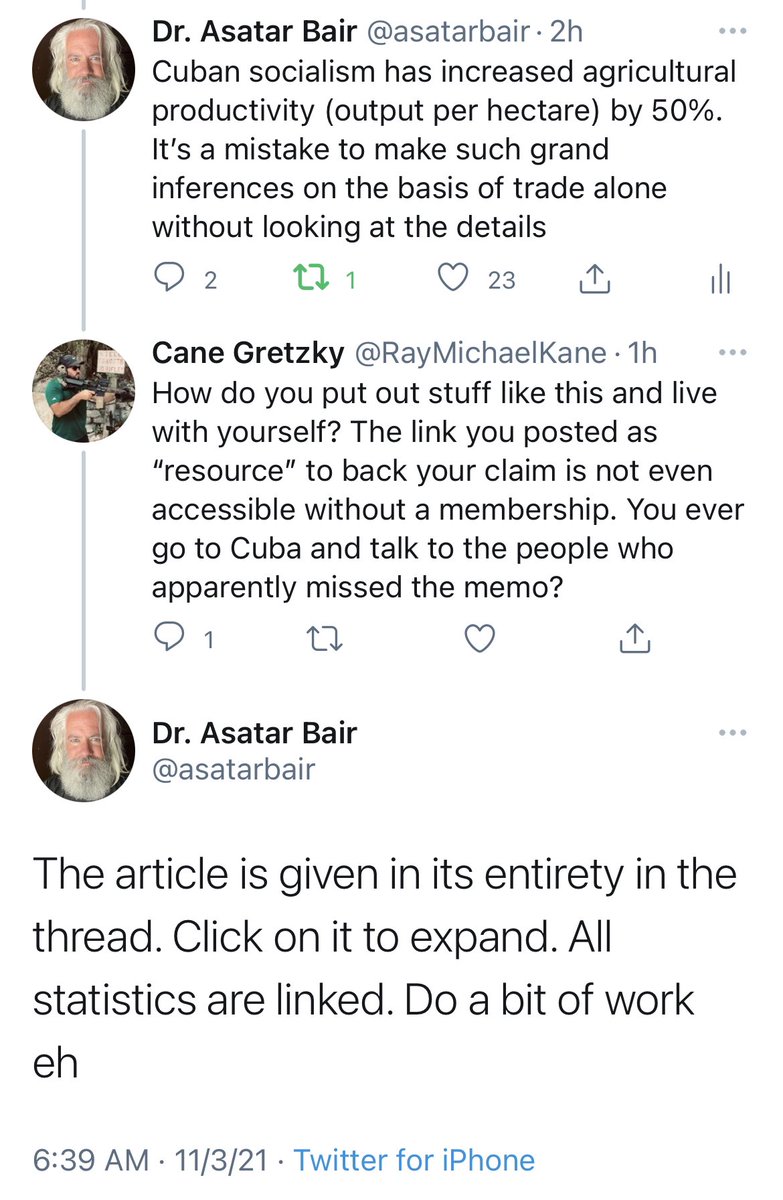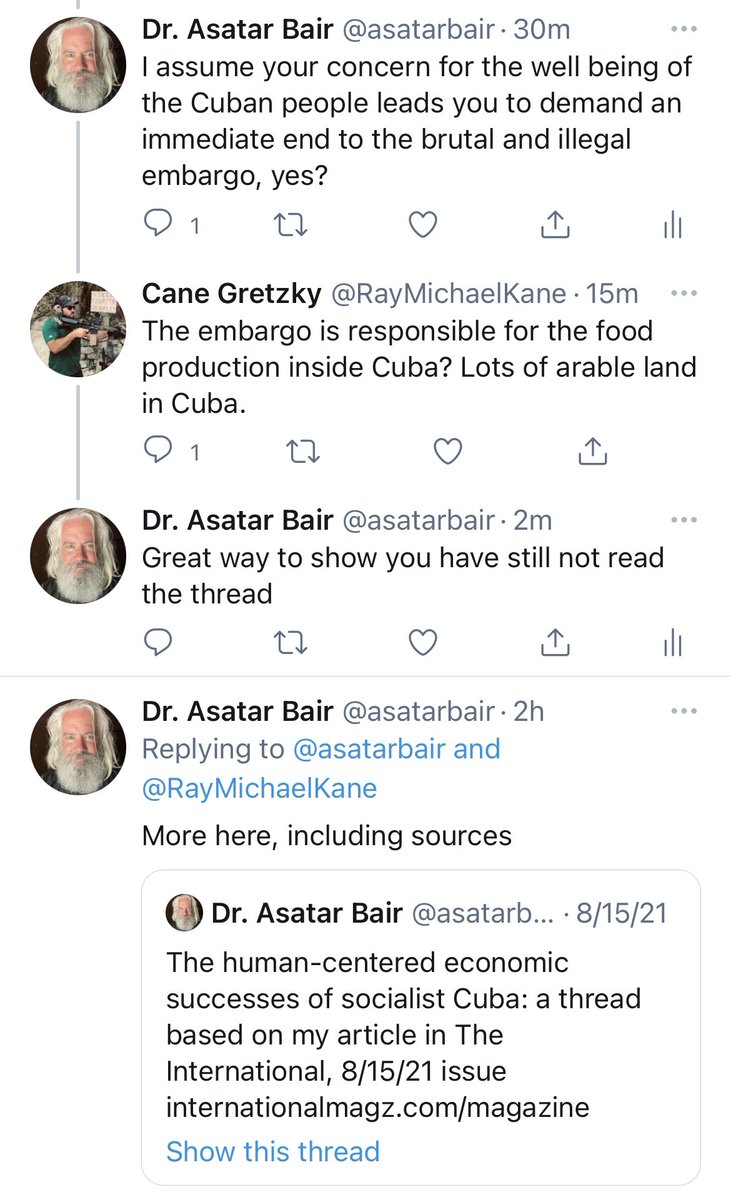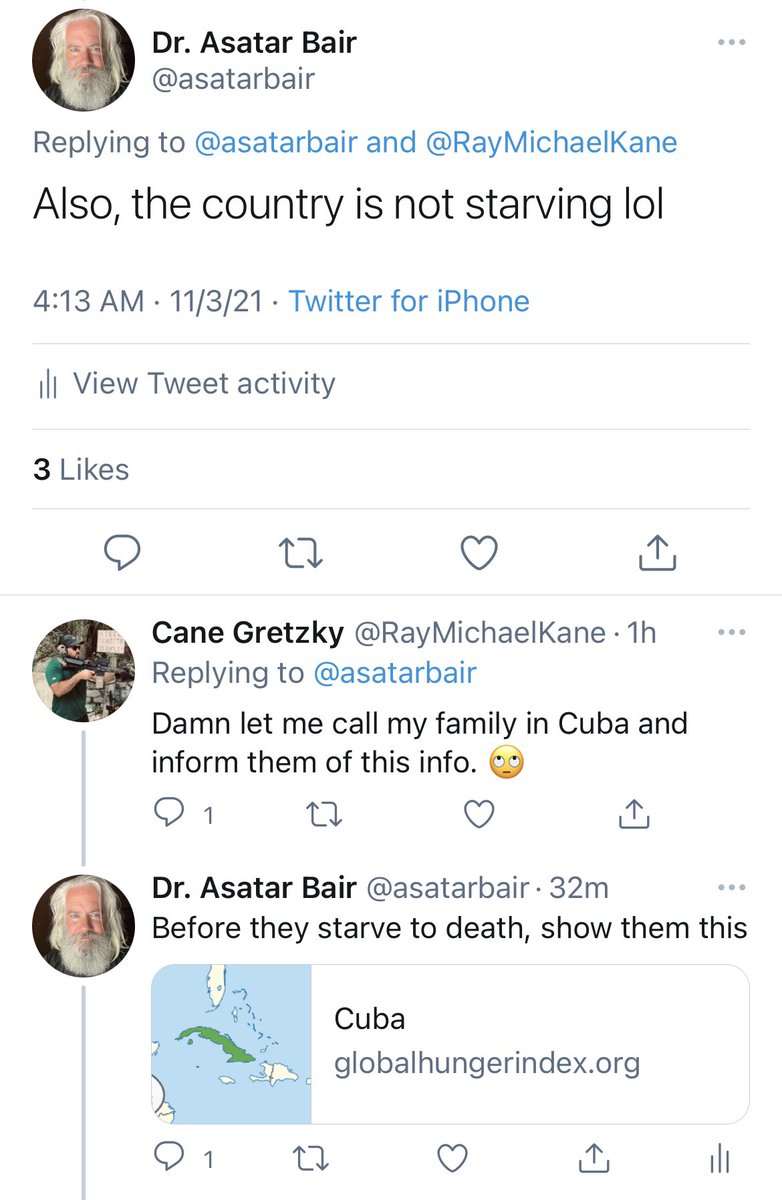
The human-centered economic successes of socialist Cuba: a thread
based on my article in The International, 8/15/21 issue internationalmagz.com/magazine
based on my article in The International, 8/15/21 issue internationalmagz.com/magazine
In 1959, Cuba’s Batista regime was overthrown by a coalition of working class people who were sick of making a few yankees rich with their blood, sweat, and tears. Though the revolution began as a response to imperialism (Cuba was a colony of the US in all but name at the time),
the character of it would ultimately mature into socialism, partially in response to continued US aggression, for example the attempted 1961 Bay of Pigs invasion
At the time of the Revolution, Cuba had a very unequal distribution of resources that is characteristic of an economy long based on slavery. Cuba was established as a colony of Spain by Columbus in 1492
thus began the process of stealing the land and genocide against the native populace and enslavement of the rest along with Africans torn from their homes by the transatlantic slave trade
About 800,000 African slaves were imported to Cuba, more than the number that went to the entire United States
The result of this massive colonial theft of land and the products of labor was that even after the abolition of slavery in 1886 by a Spanish royal decree, the land remained in very few hands
A staggering 57% of the land was owned by 3% of owners, and 78.5% of all land was owned by the top 15%. Source: Paz, p 74
scielo.br/j/ea/a/kJnbsny…
scielo.br/j/ea/a/kJnbsny…
The rise of capitalism shifted the structure of agriculture toward a low-wage capitalist sector and a tenant farming sector, with a parasitic landlord class taking a significant portion of the incomes of small farmers, who represented about 40% of the agricultural labor force
One of the problems with this arrangement is that the tenant farmers often worked small plots of land with low capital usage and low productivity, placing farmers at a low level of income
and a high risk of losing their tenancy due to fluctuations in prices of agricultural output and consumer goods, many of which were imported
One of the first policies enacted by the socialist government of Cuba was the First Agrarian Reform Law of May 1959, which eliminated the large plantations and estates that had been present since the colonization of the island
The land was turned over to the peasants who worked it, and eventually became part of the nationalized economic sector, which was initially about 33% of the total land, and ultimately grew to 82% by the 1980s. Source: Paz, linked above, p 75
For those who think that nationalization automatically reduces output, it should be noted that there was a rise in agricultural productivity of 50% from 1960 to 1990
data.worldbank.org/indicator/AG.P…
data.worldbank.org/indicator/AG.P…
The increase in agricultural output and productivity was the result of conscious planning and state action. Part of this was a straightforward state investment in agricultural capital, seen for example in about a seven-fold increase in the number of tractors on the island,
and part of it was due to efforts to diversify agriculture and restructure it toward greater productivity. Again, these efforts were quite successful.
data.worldbank.org/indicator/AG.A…
data.worldbank.org/indicator/AG.A…
If we look at the overall size of the economy, we find that in 1970, the total GDP of Cuba was about $5.7 billion; in 2019, it was $103 bil (both figures are in 2019 dollars),
a remarkable economic record that entails an average real growth rate of 6.1%, despite a crippling trade embargo by the US.
data.worldbank.org/indicator/NY.G…
data.worldbank.org/indicator/NY.G…
For comparison, Haiti, with a similar population, has a GDP of $13 bil, with a per capita GDP about one-eighth the size of Cuba
Not only is Haiti’s GDP far lower, Haiti is far less equal than Cuba, and the outcomes in terms of life expectancy, infant mortality, poverty, and unemployment are far worse despite no trade embargo. data.worldbank.org/indicator/NY.G…
The size of the economy is an important indicator, but by itself it says little about how the average working person is faring, for GDP may be concentrated in only a few hands, leaving a large part of the populace destitute. Is that the case in Cuba?
Not at all. The economic gains in Cuba have been very broadly shared. Cuba has a far higher life expectancy (78.8 years) than most Latin American countries, showing the results of strong socialist policies
This is the result of decades of conscious planning by the government, which has trained thousands of doctors as part of a massive investment in public health, giving the island the best ratio of doctors to the overall populace of any nation. bigthink.com/strange-maps/1…
This free, universal healthcare system is one of the crowning achievements of Cuban socialism, and has reduced the prevalence of one of the great tragedies that can befall a family -- the death of a child before their 1st bday -- to a remarkable 3.8 per 1,000 births
The human-centered achievements of Cuba can be seen in its Human Development Index of 0.783, which places the country in the ‘high’ category of human development, which is, to say the least, very unusual for a low-income, developing nation
One of the economic difficulties of the island is that it exports relatively low-value products (tobacco and sugar), and hence is vulnerable to swings in the prices of these commodities
Economic policy was not focused on diversification or moving up the value ladder to more complex manufactured goods partly because of strong support from the Soviet Union, which acted as the buyer of Cuban sugar and tobacco, and gave grants and other aid to Cuba
The fall of the Soviet Union created a crisis in Cuban agriculture, and for the economy as a whole, highlighting the problem of its reliance on the Soviets, and causing reforms in agriculture which ultimately shrank the national sector to 40%. Source: Paz, p 75
Cuba is not a paradise, and it is free of neither class conflict nor exploitation, and is still in the relatively early stages of socialism
Yet the conclusions we can draw from the experiment of Cuban socialism thus far could not possibly be clearer: socialism in Cuba has saved and improved millions of lives
Had capitalism prevailed there rather than socialism, the economy would no doubt look far more like Haiti, with dramatically worse results for the Cuban people
The actual record of Cuban socialism is one that all communists should have no difficulty defending, even as we recognize that socialism is just the beginning. All people should demand an end to the illegal and brutal US embargo. #VivaLaRevolucionCubana!
This thread is from my article in the new Marxist-Leninist magazine called The International. internationalmagz.com/magazine
This is an exciting new venture, and I feel it’s really important to support it for several reasons.
This is an exciting new venture, and I feel it’s really important to support it for several reasons.
First, the perspective of the magazine is Marxist-Leninist, and I think that is important to support as the largest numerical force for socialism worldwide
Second, they have a global editorial board with official representation from the Communist Party leadership in 25 countries. That is extraordinary, and it’s the kind of international cooperation we need to see a lot more of moving forward
Last, the website and article presentation is well-designed and crisply formatted. The website works well on all devices, all of which is important for conveying communism in a professional manner. Y’all know I shitpost on here, but websites can’t be shitty these days :)
Please consider subscribing if you can. It costs $25 for a year. Thank you, comrades :)
• • •
Missing some Tweet in this thread? You can try to
force a refresh















